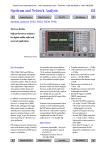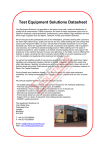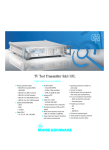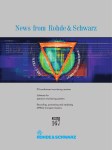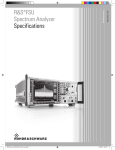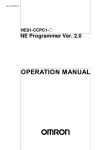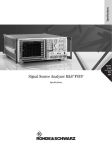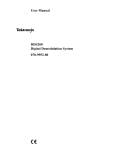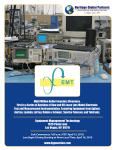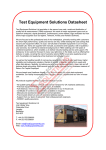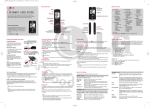Download ROHDE & SCHWARZ FSEM30 Datasheet
Transcript
Test Equipment Solutions Datasheet Test Equipment Solutions Ltd specialise in the second user sale, rental and distribution of quality test & measurement (T&M) equipment. We stock all major equipment types such as spectrum analyzers, signal generators, oscilloscopes, power meters, logic analysers etc from all the major suppliers such as Agilent, Tektronix, Anritsu and Rohde & Schwarz. We are focused at the professional end of the marketplace, primarily working with customers for whom high performance, quality and service are key, whilst realising the cost savings that second user equipment offers. As such, we fully test & refurbish equipment in our in-house, traceable Lab. Items are supplied with manuals, accessories and typically a full no-quibble 2 year warranty. Our staff have extensive backgrounds in T&M, totalling over 150 years of combined experience, which enables us to deliver industry-leading service and support. We endeavour to be customer focused in every way right down to the detail, such as offering free delivery on sales, covering the cost of warranty returns BOTH ways (plus supplying a loan unit, if available) and supplying a free business tool with every order. As well as the headline benefit of cost saving, second user offers shorter lead times, higher reliability and multivendor solutions. Rental, of course, is ideal for shorter term needs and offers fast delivery, flexibility, try-before-you-buy, zero capital expenditure, lower risk and off balance sheet accounting. Both second user and rental improve the key business measure of Return On Capital Employed. We are based near Heathrow Airport in the UK from where we supply test equipment worldwide. Our facility incorporates Sales, Support, Admin, Logistics and our own in-house Lab. All products supplied by Test Equipment Solutions include: - No-quibble parts & labour warranty (we provide transport for UK mainland addresses). - Free loan equipment during warranty repair, if available. - Full electrical, mechanical and safety refurbishment in our in-house Lab. - Certificate of Conformance (calibration available on request). - Manuals and accessories required for normal operation. - Free insured delivery to your UK mainland address (sales). - Support from our team of seasoned Test & Measurement engineers. - ISO9001 quality assurance. Test equipment Solutions Ltd Unit 8 Elder Way Waterside Drive Langley Berkshire SL3 6EP T: +44 (0)1753 596000 F: +44 (0)1753 596001 Email: [email protected] Web: www.TestEquipmentHQ.com Spectrum Analyzers FSEx 20 Hz to 40 GHz ◆ Spectrum analysis with ultra-wide dynamic range Noise figure = 18 dB/TOI = 20 dBm typ. (FSEB) ◆ Universal analysis of digital and analog modulated signals (option) such as BPSK, QPSK, π/4-DQPSK, 8PSK, QAM, MSK, GMSK, 2FSK, AM, FM, PM ◆ High-speed synthesizer 5 ms for full span (FSEA, FSEB) ◆ Refresh rate, quasi-analog 25 sweeps/s ◆ Large LC TFT display 24 cm/9.5", active ◆ Future-proof modular design Customized solutions through wide variety of options Characteristics The FSE spectrum analyzers from Rohde& Schwarz have been optimized both for general-purpose measurements and meeting the stringent requirements of testing advanced digital communication systems. High measurement speed, future-proof modular design and excellent characteristics put the analyzers right at the top of today's market – at an attractive price. ◆ Combines the following functions: spectrum analysis and analysis of digitally modulated signals (option) ◆ Spectrum analysis with maximum dynamic range ◆ Adaptation of all models to your specific requirements by means of a wide range of options Frequency Intermodulation, harmonics Spurious Phase noise Time Burst Power ramping Gated measurements Modulation Vector, frequency and phase errors Eye and constellation diagrams Modulation depth and deviation Ausklappseite 1 (vorne) Overview WCDMA CDMAone PHP GSM 900 DAB NADC TFTS DECT ISM WLAN GSM 1800/1900 BLUETOOTH SATELLITE RADAR MICROWAVE LINKS FSEA 30 FSEB 30 FSEM 30 FSEK 30 20 Hz 9 kHz 1 GHz 2 GHz 3.5 GHz 7 GHz 26.5 40 GHz ((eingeklappter Zustand)) ((Beschnittkante)) The spectrum analyzers from Rohde&Schwarz ((Beschnittkante)) Modular design for a safe investment The FSE "option building blocks" Option/function/software Designation ((ausgeklappter Zustand)) Ausklappseite 2 (vorne) Frequency range up to 3.5 GHz – FSEA30 FSEB30 FSEM30 FSEK30 ● – – – 7 GHz Frequency Extension FSE-B2 ❍ ● – – Vector Signal Analyzer FSE-B7 ❍ ❍ ❍ ❍ Tracking Generator 3.5 GHz FSE-B8 ❍ – – – Tracking Generator 3.5 GHz with I/Q Modulator FSE-B9 ❍ – – – Tracking Generator 7 GHz FSE-B10 – ❍ ❍ ❍ Tracking Generator 7 GHz with I/Q Modulator FSE-B11 – ❍ ❍ ❍ Switchable Attenuator for Tracking Generator FSE-B121) ❍ ❍ ❍ ❍ 1 dB Attenuator FSE-B13 ❍ ❍ ❍ ❍ Controller FSE-B15 ❍ ❍ ❍ ❍ Ethernet Interface FSE-B16 ❍ ❍ ❍ ❍ 2nd IEC/IEEE-Bus Interface FSE-B17 ❍ ❍ ❍ ❍ ❍ ❍ ❍ ❍ 1)2) 3) Removable Hard Disk FSE-B18 2nd Hard Disk for FSE-B18 FSE-B19 ❍ ❍ ❍ ❍ External Mixing FSE-B21 – – ❍ ❍ Increased Level Accuracy up to 2 GHz FSE-B22 3) ❍ ❍ ❍ ❍ Broadband Output 741.4 MHz FSE-B23 3) ❍ ❍ ❍ ❍ 44 GHz Frequency Extension for FSEK FSE-B24 3) – – – ❍ Noise Measurement Software FS-K3 ❍ ❍ ❍ ❍ Phase Noise Measurement Software FS-K4 ❍ ❍ ❍ ❍ GSM Application Firmware FSE-K10/-K11 ❍ ❍ ❍ ❍ EDGE Application Firmware FSE-K20/-K21 ❍ ❍ ❍ ❍ ● Incorporated in basic model 1) 2) 3) FSE-B12 and FSE-B13 cannot be fitted together. In combination with FSE-B22 factory-fitted only. Factory-fitted only. ❍ Can be retrofitted (option) Getting down to analysis ◆ Resolution bandwidths 1 Hz to 10 MHz, adjustable in steps of 1/2/3/5/10 ◆ Displayed noise floor –150 dBm (typ.) in 10 Hz bandwidth ◆ 3rd-order intercept point +20 dBm typ. ◆ 1 dB compression point of RF input +10 dBm ◆ Phase noise at 10 kHz from carrier: –123 dBc (Hz) (typ.) (FSEA 30) ◆ Total level measurement uncertainty up to 1 GHz <1 dB, up to 7 GHz 1.5 dB ◆ AM/FM audio demodulator (with built-in loudspeaker and headphones connector) ◆ Internal RF trigger (trigger threshold approx. –20 dBm) ◆ 5 ms full-span sweep time with fully synchronized sweep (FSEA, FSEB), 150 ms with FSEM, 230 ms with FSEK ◆ 1 µs zero-span sweep time ◆ Pretrigger and trigger delay ◆ Gated sweep Vector analysis for digital communication Modularity safeguards investments The analyzers of the FSE family combine the capabilities of high-end RF or microwave spectrum analysis with those of universal digital-signal demodulation and analysis. This becomes possible with the vector signal analyzer option. The spectrum analyzer function offers the wide dynamic range necessary for many measurements on digitally modulated signals (e.g. burst measurements), and the vector signal analyzer option adds demodulation capability to bit stream level for signals such as Series FSE analyzers are of modular design throughout. From the wide variety of options, you can choose exactly those needed for your particular application (see also fold-in page). than what you actually need. At the same time, you can feel sure that FSE will grow with your tasks and requirements as virtually all options can be retrofitted. Even extending the frequency range from 3.5 GHz to 7 GHz is no problem with option FSE-B2. ● ❍ ❍ ● ❍ ◆ ◆ ◆ ◆ Eye diagram Vector and constellation diagram Frequency and phase error Vector error With a spectrum analyzer of the FSE family, you are perfectly equipped for the future of digital communication. ● Required 2 ❍ Recommended Spectrum Analyzers FSEx General-purpose RF measurements AM and FM sound broadcasting TV and CATV ❍ All this is backed up by a variety of display types: Your decision for Spectrum Analyzer FSE is a decision for a safe investment. FSE options and their applications Analog mobile radio systems – BPSK, QPSK, π/4-DQPSK – 16QAM, (G)MSK, (G)FSK You thus get an instrument tailor-made to your requirements and pay for no more Digital mobile radio systems Specifications in brief ❍ ❍ FSE-B2 7 GHz Frequency Extension FSE-B7 Vector Signal Analyzer FSE-B8/-B9/-B10/-B11 Tracking Generator FSE-B13 1 dB Attenuator ❍ FSE-B15 Controller ❍ FSE-B21 External Mixing ❍ FSE-B23 Broadband Output 741.4 MHz ❍ FS-K3 Noise Measurement Software ❍ FS-K4 Phase Noise Measurement Software ❍ FSE-K10/-K11 GSM Application Firmware ❍ FSE-K20/-K21 EDGE Application Firmware ❍ ❍ ❍ ❍ ❍ ❍ High speed increases efficiency The high speed of FSE increases efficiency in development and production: ◆ FSE features a minimum full-span sweep time of 5 ms (FSEA/B) with a fully synchronized sweep. This means that added speed is not at the expense of frequency accuracy but even enhances it ◆ The shortest zero-span sweep time is 1 µs (100 ns/div) – ideal for highresolution measurements on pulse edges ◆ Up to 25 sweeps per second is an optimal prerequisite for rapid and easy alignments and for applications in production With its high measurement speed and great ease of operation, FSE will solve even highly complex measurement tasks in next to no time. Spectrum Analyzer FSEM30 Certified Quality System ISO 9001 DQS REG. NO 1954 Spectrum Analyzers FSEx 3 The features in detail ... FSEA 30 resolution bandwidth 1 MHz 109 dB dynamic range −99 dBm displayed noise floor of FSE at 1 MHz resolution bandwidth typ. −159 dBm displayed noise floor of FSEA 30 at 1 Hz −174 dBm (Hz) noise floor at room temperature 1 MHz resolution bandwidth (1 Hz) 60 dB FSEA noise figure typ. 15 dB –40 –50 I 169 dB –60 TO FSEA 30 resolution bandwidth 1 Hz Displayed noise floor and intermodulation-free range relative to mixer level [dB] +10 dBm 1 dB compression point Dis play ed –70 Dis –80 –90 play Dis play ed –100 ed se f loor loor mo (BW (BW (BW Har =1 =1 kHz ) 0H =1 z) Hz) –120 –60 –50 –40 –30 –20 –10 0 Mixer level [dBm] Dynamic range, noise, 3rd-order intercept point FSE is outstanding for its extremely low noise floor without any impairment to the dynamic range at large signal levels. This can be seen, for example, from the 1 dB compression point of +10 dBm, which yields the best dynamic range available even at a resolution bandwidth of 1 MHz, allowing GSM and DECT power ramps to be determined. FSEM/K 30 open up the microwave range through to 26.5 GHz/40 GHz and retain the excellent characteristics of the basic models: Spectrum Analyzers FSEx se f noi From AF to microwave 4 loor noi Tops in dynamic range Taking as a figure of merit of an analyzer the difference between its 3rd-order intercept point and its noise figure, FSEA has a value of around 0 dB. Put this figure to the test. se f –110 –70 Dynamic range, noise and 1 dB compression point of Spectrum Analyzer FSEA30 at different resolution bandwidth An extremely wide intermodulation-free dynamic range of 115 dB is obtained due to the low noise figure and the high 3rdorder intercept point. This not only yields reliable intermodulation measurements on highly linear amplifiers, but also ensures a sufficient dynamic range for adjacent-channel power measurements on digitally modulated signals. noi ion ess ppr su nics ◆ Continuous full-span sweep ◆ Fundamental mixing (low noise floor) as well as wide dynamic range up to 26.5 GHz ◆ Fully synchronized sweep with high frequency accuracy even for Full span (26.5 GHz/40 GHz) ◆ RF input adapters for N or PC 3.5 mm, or K connector (FSEM or FSEK) Option FSE-B21 allows the frequency range of FSEM and FSEK to be extended by means of external mixers. Mixers FS-Z60 (40 GHz to 60 GHz), FS-Z75 (50 GHz to 75 GHz), FS-Z90 (60 GHz to 90 GHz) and FS-Z110 (75 GHz to 110 GHz) are available as extras. Continuous automatic signal identification, which is used to suppress unwanted image frequency bands and mixture products, ensures fast and easy measurements. Due to the built-in diplexer, two-port as well as three-port mixers can be used. The external mixer measurement function features great ease of operation: ◆ Definition of frequency range and harmonics by selecting a waveguide band ◆ Definition of all important parameters for each waveguide band separately ◆ Frequency-dependent consideration of mixer conversion loss ◆ Storage of parameters on hard disk Unattained measuring convenience FSE makes measuring easy for you through a large number of convenient test functions: ◆ 4 markers, 4 delta markers ◆ Marker functions for direct measurement of – phase noise and noise power density – NEXT MIN/PEAK, NEXT MIN/PEAK RIGHT, NEXT MIN/PEAK LEFT – bandwidths and shape factor ◆ Measurement of channel power, adjacent channel power and occupied bandwidth ◆ Frequency counter with selectable resolution ◆ LOW NOISE, NORMAL and LOW DISTORTION modes for low-intermodulation and low-noise operation ◆ Hardcopy at a keystroke ◆ Simultaneous measurement of four active traces ◆ Level, frequency and user-definable limit lines as evaluation help with pass/fail information ◆ Split screen with independent measurement windows Frequency accuracy – to the point Tuning on FSE is absolutely synchronous to the reference frequency for each span including full span. This means that every point on the frequency axis is determined with the accuracy of the internal reference frequency and the pixel resolution. Thus, when reducing the span for detailed signal analysis, the tiresome readjustment of the center frequency is no longer needed. FSE in its basic configuration includes an AM/FM audio demodulator. Unknown signals can easily be identified via headphones or the built-in loudspeaker. Modulation measurements are possible using the optional Vector Signal Analyzer FSEB7. Limit lines facilitate checking whether results are within predefined tolerances. Virtually any number of limit lines can be defined with high accuracy by means of 50 points to meet even the most exacting requirements. Scalar network analysis The optional tracking generators (see data sheet for FSE-B8/9/10/11 PD 0757.3434) are an ideal tool for determining frequency response, attenuation or VSWR and feature the following characteristics: ◆ Wide dynamic range for attenuation measurements (up to 120 dB) ◆ Frequency range from 9 kHz to 3.5/7 GHz ◆ Frequency offset up to ± 200 MHz for measurements on frequency-converting modules The tracking generators with built-in I/Q modulator are ideal for generating digitally modulated signals. An external two-channel Arbitrary Waveform Generator (e.g. AMIQ from Rohde&Schwarz) serves as modulation source. By adding the optional Vector Signal Analyzer FSE-B7, FSE can be expanded to a test assembly enabling direct measurement of the influence of amplifiers or filters on phase error for instance. Operation – as you like it Despite their comprehensive functionalities the analyzers feature great ease of operation. Basic functions and frequently used help tools such as markers can be called at a keystroke. The full operating convenience based on a wide variety of evaluation routines and marker functions can be accessed via the menus. All essential parameters and results can be seen at a glance. All test data, scale factors and setting parameters are logically arranged and therefore easy to find. Setups, traces and graticules displayed in colour make for error-free analysis of complex results. All models are equipped with a large 24 cm (9.5") TFT colour display with VGA resolution (640 x 480 pixels). The USER key allows the FSE operation to be tailored to your specific requirements. With this key, you can compile the functions mainly needed for your measurement tasks, which does away with frequent menu changes and speeds up measurements on the whole. Test results – perfectly documented FSE affords uncomplicated logging of results. It supports a wide variety of printers such as: ◆ Printer with HP-PCL4 and HP-PCL5 ◆ HP Deskjet/HP Laserjet ◆ Postscript Print files cannot only be output via an interface but can also be stored on diskette or the internal hard disk. With PCX, WMF and HP-GL (without option Spectrum Analyzers FSEx 5 ... The features in detail Designation Noise Measurement Software Phase Noise Measurement Software Application Firmware1) Application Firmware2) 1) 2) Type Use Functions FS-K3 Noise figure measurements - Measurement of noise figure and temperature to Y-factor method - Measurements on frequency-converting devices - Frequency range same as basic unit, starting from 100 kHz - Editor for ENR tables - Runs on the internal controller (option) or on an external PC (WindowsNT/Windows98) FS-K4 Phase noise figure measurements - Easy-to-use phase noise measurements - Measurement of residual FM and PM - Logarithmic plot over 8 decades - Runs on the internal controller (option) or on an external PC (WindowsNT/Windows98) FSE-K10, Mobile FSE-K11, BTS - Power ramp and power template Mobile radio transmit- Spectrum due to modulation/switching ter measurements to - Spurious emissions GSM standards 11.10 - Mean carrier power and 11.20 - Phase/frequency error (with option FSE-B7) FSE-K20, Mobile FSE-K21, BTS EDGE capability added to Application Firmware FSE-K10 and FSE-K11 See data sheet FSE-K10/-K11. See data sheet FSE-K20/-K21. FSE-B15) as well as BMP and WMF (with option FSE-B15) print formats being available, there is no problem in further processing print files in standard text processing systems. Using Controller FSE-B15, it is particularly easy to generate test reports and integrate the results. Texts can then be processed under Windows on FSE itself. FSE as a controller The optional Controller FSE-B15 provides a further VGA card, a memory extension to 64 Mbyte, a serial mouse and a keyboard. With this option, WindowsNT applications, e.g. statistics programs or spreadsheet analysis, can be installed on FSE. FSE can even be linked to a network using the optional Ethernet Interface FSE-B16. 6 - Modulation accuracy measurement including EVM measurement using weighting filter to ETSI 95:th-percentile measurement measurement of origin offset suppression - Limit lines for EDGE to ETSI05.05 Spectrum Analyzers FSEx Complete setups, traces, limit lines and macros can be stored on the internal hard disk or on a diskette using the built-in 1.44 Mbyte drive. Low overall costs FSE in automatic test systems ◆ ◆ ◆ ◆ ◆ FSE is ideal for use in automatic test systems, affording not only fast processing of results but also an IEC/IEEE-bus command set conforming to SCPI. Moreover, with optional Controller FSE-B15 and a second IEC/IEEE-bus card (option FSE-B17), FSE can be used as a controller for test systems, thus eliminating the need for further units and saving space in the system cabinet. In designing FSE, special emphasis was placed on keeping after-sales costs to a minimum: Temperature-controlled fans Calibration interval up to 2 years Built-in calibration routines Numerous selftest routines Modular design Calibration routines Built-in calibration routines ensure that FSE remains within defined tolerances and thus maintains its accuracy of measurement. The routines are not performed automatically by the instrument but can be started by the user, thus avoiding ongoing measurements to be interrupted. The results of calibration routines are output by FSE in the form of comprehensive correction tables. Comparing these tables over an extended period of time, the user can detect changes early and take corrective steps in time. This enhances confidence in the unit’s reliability and measurement accuracy. A particular asset in system applications is the internally selectable, high-precision level calibration source, which reduces the number of cables required. Selftest – the built-in diagnostic system Modular design – easy retrofitting of options The instrument selftest rapidly locates any faults down to module level. Defective modules can be replaced nearly without adjustments or extra test equipment being required. This in conjunction with the quick spare parts service from Rohde&Schwarz reduces any repair or downtime costs that might arise. The low operating costs go easy on your budget. The modular concept of the most important options such as Vector Signal Analyzer and 7 GHz Frequency Extension, as well as the alignment-free incorporation of the remaining options make it possible to retrofit the instrument with a minimum of downtime or installation costs being involved. Quality management at Rohde&Schwarz Lasting customer satisfaction is our primary objective. The quality management system of Rohde&Schwarz meets the requirements of ISO9001 and encompasses largely all fields of activity of the company. Rear view of FSE Spectrum Analyzers FSEx 7 Applications ... 1 3 2 4 General-purpose RF measurements harmonic can be displayed simultaneously with high resolution. Two-tone measurements (1) FSE facilitates intermodulation measurements with its wide intermodulation-free dynamic range, which reduces measurement errors. This feature is enhanced by the LOW DISTORTION mode, which ensures optimum RF attenuation. Evaluation of results is rapid and easy by means of markers and delta markers. Low noise floor even in the microwave range (3) Thanks to fundamental mixing FSEM features the same constantly low noise floor as an RF analyzer up to 26.5 GHz. As a consequence, FSEM offers not only a wide dynamic range, but also a considerably increased speed for measuring small signals in the microwave range: Larger resolution bandwidths and high sensitivity reduce sweep time while maintaining the S/N ratio. This is of great advantage when measuring spurious and harmonics alike. Harmonics measurements with split screen (2) The split-screen function has been provided for the convenient analysis of results. In harmonics measurements, for example, the fundamental and the first 8 Spectrum Analyzers FSEx FSE phase noise as a function of carrier spacing (4) With a phase noise of –123 dBc (Hz) at 10 kHz from the carrier, the synthesizer incorporated in FSEA 30 is ideal for measuring the phase noise of oscillators or the adjacent-channel power of radio equipment. 5 7 6 Noise figure measurements Noise Measurement Software FS-K3 (5) FS-K3 turns your FSE into a noise measurement system offering the advantages of an analyzer (see also data sheet PD 0757.2380): ◆ Wide variety of resolution bandwidths for every application, even for measurements on narrowband DUTs ◆ If results are doubtful, the analyzer allows the test setup to be checked for radiated interference or nonharmonics ◆ Lower frequency limit of 100 kHz ◆ Measurements on frequency-converting DUTs supported by external generator Phase Noise Measurement Software FS-K4 (6) With FS-K4 (see also data sheet PD 0757.4201), FSE can be used as a phase noise analyzer. The phase noise of an input signal can easily be measured over several decades and displayed on a logarithmic frequency axis. The residual FM or PM can be determined conveniently within freely selectable limits. RMS detector: power measurement without correction factors (7) In the example, the power of a CDMA signal in the transmission channel and the adjacent channels is measured. The two traces show the influence of the DUT on the adjacent-channel power. Measuring power and adjacent-channel power of digitally modulated signals requires a spectrum analyzer to be equipped with special detectors and test routines. FSE is the first spectrum analyzer that features a real power detector with wide dynamic range – the RMS detector. Like a thermocouple power meter, this detector guarantees stable and accurate test results without any correction factors. Considerably higher test throughput is achieved than with the usual sample detector. Using the available default settings for ACP measurements in line with common standards (NADC, PDC, CDMA, WCDMA, etc) precise test results are obtained easily and fast. Spectrum Analyzers FSEx 9 ... Applications 8 10 9 11 Mobile radio – digital and analog RF power trigger replaces external trigger (no illustration) An internal broadband level detector (center frequency ±50 MHz) with a fixed switching threshold of approx. –20 dBm at the first mixer is used as a trigger source. With this detector it is possible, for example, to perform "spectrum due to switching" and "spectrum due to modulation" measurements to GSM specifications without an external trigger. The detector replaces the external trigger needed in the gated sweep mode. 10 Spectrum Analyzers FSEx Gap sweep: simultaneous measurement of pulse rise and fall times with high time resolution (8 and 9) The fast sweep time of 100 ns/div as well as the gap sweep and pretrigger functions of Spectrum Analyzer FSE make it possible to measure the rise and fall times of an RF pulse simultaneously and with high time resolution. The center of the pulse, which is of no interest, is blanked. Even at a resolution bandwidth of 1 MHz FSE offers a dynamic range of over 80 dB thanks to the high 1 dB compression point of +10 dBm. Gated sweep (10 and 11) The gated sweep function is indispensable for analyzing TDMA signals used in modern communication systems. With this function, the spectrum of burst signals can be investigated without any interference being caused by switching the signals on and off. The selected gate time determines over what interval a pulse is to be analyzed. Selection of the gate time is easy and convenient in the time domain display (zero span) of the pulse. 12 14 13 Vector signal analysis Universal analysis of digital signals Spectrum Analyzer FSE in conjunction with the optional Vector Signal Analyzer FSE-B7 is ideal for demodulating and measuring digitally modulated signals with frequencies up to 3.5 GHz, 7 GHz, 26.5 GHz or 40 GHz. This universal tool offers a wide variety of settings: ◆ Demodulation of all common mobileradio signals ◆ Symbol rates up to 2 MHz ◆ Type of filter ◆ Roll-off factor or BT product of filter ◆ Synchronization bit sequences ◆ Predefined, application-specific settings for all common standards, e.g. GSM, PCS1900, NADC, CDMA (IS95) 12 I/Q signal and phase error measurements over 50 symbols of a GSM mobile 13 Measurement of GSM power ramps to standards with high-precision time reference through synchronization to mid-amble 14 Measurement of modulation errors of π/4-DQPSK signals (NADC) Versatile display of results ◆ Inphase and quadrature signals ◆ Magnitude and phase ◆ Vector and constellation diagrams ◆ Eye and trellis diagrams ◆ Sum fault: amplitude, frequency, phase, vector Power ramp measurements To perform power ramp measurements to standards on TDMA systems such as GSM or DECT, reference must be made to synchronization sequences (pre- or midamble) in order to establish a time reference. Making such measurements to standard is not possible using conventional analyzers – but it is no problem with FSE! Accurate AM, FM and PM measurements Featuring high-accuracy measurement of the modulation depth and frequency deviation coupled with the display of demodulated signals in the time domain, FSE not only enables testing of analog and dual-mode radio equipment but also the determination of the transient response in frequency and amplitude (see data sheet PD 0757.2167). Spectrum Analyzer FSE and the optional vector signal analyzer provide universal test capabilities in one unit. Spectrum Analyzers FSEx 11 Specifications FSEA30 FSEB30 FSEM30 FSEK30 Specifications are guaranteed under the following conditions: 30 minutes warmup time at ambient temperature, specified environmental conditions met, calibration cycle adhered to, and total calibration performed. Data without tolerances: typical values only. Data designated "nominal" apply to design parameters and are not tested. Frequency Frequency range Frequency resolution Internal reference frequency, nominal Aging per day1) Aging per year1) Temperature drift (0°C to +50°C) Total error limit (per year) External reference frequency Frequency display Resolution Error limit (sweep time >3 × auto sweep time) Frequency counter Resolution Count accuracy (S/N >25 dB) Display range for frequency axis Resolution/error limit of display range Spectral purity (dBc (Hz)) SSB phase noise, f ≤500 MHz Carrier offset 100 Hz 1 kHz 10 kHz 100 kHz2) 1 MHz 2) Sweep time Span = 0 Hz Span ≥10 Hz Error limit Picture refresh rate (span ≤7 GHz) Sampling rate Number of pixels Time measurement Resolution Sweep trigger Zero span Resolution bandwidths 3 dB bandwidths (in 1/2/3/5 steps) FFT filter (in 1/2/3/5 steps) (see also page 16) 20 Hz to 3.5 GHz 20 Hz to 7 GHz 20 Hz to 26.5 GHz 0.01 Hz 20 Hz to 40 GHz 1x10–9 2 x10–7 5 x10–8 2.5 x10–7 10 MHz or n × 1 MHz, n = 1 to 16 with marker 0.1 Hz to 10 kHz (as a function of span) ±(marker frequency × reference error + 0.5 % × span + 10 % × resolution bandwidth + 1/2 (last digit)) measures the marker frequency 0.1 Hz to 10 kHz (selectable) ±(frequency × reference error + 1/2 (last digit)) 0 Hz, 10 Hz to full span 0.1 Hz/1% for f >500 MHz see diagram below <–87 <–107 <–120 <–119 <–138 <–81 <–100 <–114 <–113 <–132 1 µs to 2500 s in 5% steps 5 ms to 16 000 s in steps ≤10% <1% >20 updates/s with 1 trace, >15 updates/s with 2 traces 50 ns (20 MHz A/D converter) 500 with marker and cursor lines 50 ns free run, single, line, video, gated, delayed, external additionally pretrigger, posttrigger, trigger delay 1 Hz to 10 MHz 1 Hz to 1 kHz –60 dBc (Hz) –70 FSEA 500 MHz FSEA 3.5 GHz FSEB/M/K 500 MHz FSEB/M/K 3.5 GHz FSEM/K 26 GHz FSEK 40 GHz –80 SSB phase noise –90 –100 –110 –120 –130 –140 –150 –155 100 Hz SSB phase noise (typical values) 12 Spectrum Analyzers FSEx 1 kHz 10 kHz 100 kHz 1 MHz Carrier offset 10 MHz Specifications FSEA30 FSEB30 ≤3 MHz 5 MHz 10 MHz Shape factor 60:3 dB <1 kHz 1 kHz to 2 MHz >2 MHz Video bandwidths Bandwidth error FSEM30 <10% <15% +25%, –10% <6 <12 <7 1 Hz to 10 MHz, 1/2/3/5 steps FSEK30 Level Display range Maximum input level RF attenuation 0 dB DC voltage CW RF power Pulse spectral density RF attenuation ≥10 dB DC voltage CW RF power Max. pulse voltage Max. pulse energy (10 µs) 1 dB compression of input mixer (0 dB RF attenuation) Displayed average noise floor Frequency 20 Hz 1 kHz 10 kHz 100 kHz 1 MHz 10 MHz to 3.5/6 GHz 6 GHz to 7 GHz 7 GHz to 18 GHz 18 GHz to 26.5 GHz 26.5 GHz to 30 GHz 30 GHz to 40 GHz Max. dynamic range, bandwidth 1 Hz Displayed noise floor to 1 dB compression Max. harmonics suppression, f >50 MHz Max. intermodulation-free range 50 MHz to 3.5 GHz (nominal) 150 MHz to 7/26.5 GHz (nominal) Intermodulation TOI, intermodulation-free dynamic range, level 2 × −30 dBm, ∆f >5 × RBW or >10 kHz Intermodulation-free range at –40 dBm mixer level Intercept point k2 (dBm) noise floor displayed to 30 dBm 0V 20 dBm (=0.1 W) 97 dBµV (MHz) 0V 30 dBm (=1W) 150 V 1mWs +10 dBm nominal in dBm (0 dB RF attenuation, RBW 10 Hz, VBW 1 Hz, 20 averages, trace average, span 0 Hz, termination 50 Ω) <–80 <–74 <–110 <–104 <–125 <–119 <–135 <–129 <–145, –150 typ. <–142, typ. –145 <–145, –150 typ. <–142, –147 typ. <–138, –140 typ. – <–139 <–135, –138 typ. – – <–138, –140 typ. <–134, –139 typ. – – <–135, –138 typ. <–131, –136 typ. – – – <–120, –125 typ. – – – <–116, –122 typ. 165 dB 162 dB 160 dB >90 dB 115 dB – – 115 dB >84 dBc for f >50 MHz (TOI >12 dBm, 18 dBm typ. ) >90 dBc for f >150 MHz (TOI >15 dBm, 20 dBm typ. ) >25, >40 typ. for f <50 MHz, >45, >50 typ. for f >50 MHz Immunity to interference Image frequency (dB) Intermediate frequency (dB) Spurious response (f >1 MHz, without input signal, 0 dB attenuation) Span <30 MHz Span ≥30 MHz fin = 25.06 MHz, 25.175 MHz, 5.7172 GHz fin = 60 MHz fin = 14.1894 GHz, 15.6722 GHz Span >10 MHz Other interfering signals (mixer level <–10 dBm) 50 V 0.5 mWs – 112 dB >94 dBc for f >100 MHz >80 dBc for f >7 GHz, (TOI >17 dBm, 22 dBm typ.; >10 dBm for f >7 GHz) 105 dB >25 for f <150 MHz, >35 typ., >40 for f >150 MHz, >45 typ. >80, >90 typ. >80, >90 typ. for f <22 GHz >75, >80 typ. for f >22 GHz >75 dB >100 dB <–110 dBm <–100 dBm <–100 dBm <–110 dBm <–100 dBm −90 dBm <–80 dB3) <–75 dB 3) Spectrum Analyzers FSEx 13 Specifications FSEA30 Level display Measurement display Logarithmic level range Linear level range Traces Trace detector Trace functions Setting range of reference level Logarithmic level display Linear level range Units of level axis Level measurement uncertainty (–40 dBm, RF attenuation 20 dB, reference level –15 dB, RBW 5 kHz) Absolute error limit at 120 MHz Frequency response (10 dB RF attenuation) <1 GHz 1 GHz to 3.5/7 GHz 7 GHz to 18 GHz 18 GHz to 26.5 GHz 26.5 GHz to 40 GHz Attenuator error limit IF gain error Display nonlinearity Logarithmic level display (RBW ≥1 kHz, analog) 0 dB to –50 dB –50 dB to –70 dB –70 dB to –80 dB –70 dB to –95 dB Linear level display Bandwidth switching error 1 Hz to 30 kHz/100 to 500 kHz 1 MHz to 10 MHz Total measurement uncertainty (0 dB to 50 dB below reference level, span/RBW <100, rss 95% reliability) <1 GHz 1 GHz to 3.5/7 GHz 7 GHz to 18 GHz 18 GHz to 26.5 GHz 26.5 GHz to 40 GHz Pulse amplitude error (single pulses) Bandwidth <1 MHz/≥1 MHz FSEB30 FSEM30 FSEK30 500 × 400 pixels (with one diagram displayed); max. 2 diagrams with independent settings 10 dB to 200 dB, in steps of 10 dB 10% of reference level per division (10 divisions) or logarithmic scaling max. 4 per diagram (max. 2 if 2 diagrams are displayed) quasi-analog display of all results max peak, min peak, auto peak (normal), sample, rms, average clear/write, max hold, min hold, average –130 dBm to 30 dBm, in steps of 0.1 dB 7.0 nV to 7.07 V in steps of 1% dBm, dBµV, dBmV, dBµA, dBpW (logarithmic and linear level display); mV, µV, mA, µA, pW, nW (linear level display) The values are guaranteed for bandwidths from 10 Hz to 30 kHz and 100 kHz to 10 MHz. <0.3 dB <0.5 dB <1 dB – – – – <0.3 dB <0.2 dB (0.1 dB typ.) <2 dB4) <2.5 dB4) <3 dB4) <0.3 dB <0.5 dB – <1 dB 5% of reference level <0.2 dB <0.3 dB <1 dB <1.5 dB – – – – <2.5 dB4) <3 dB4) <3.5 dB4) <0.5 dB, nominal/<2 dB, nominal Trigger functions Trigger Delayed sweep Trigger source Delay time Error of delay time Delayed sweep time Gated sweep Trigger source Gate delay Gate length Error of gate length Gap sweep (span = 0 Hz) Trigger source Pretrigger Trigger to gap time Gap length 14 Spectrum Analyzers FSEx free run, line, video, RF, external free run, line, video, RF, external 100 ns to 10 s, resolution 1 µs min. or 1% of delay time ±(1 µs + (0.1% x delay time)) 2 µs to 1000 s external, RF level 1 µs to 100 s 1 µs to 100 s, resolution min. 1 µs or 1% of gate length ±(1 µs + (0.05% × gate length)) free run, line, video, RF, external 1 µs to 100 s, 50 ns resolution, dependent on sweep time 1 µs to 100 s, 50 ns resolution, dependent on sweep time 1 µs to 100 s, 50 ns resolution Specifications FSEA30 FSEB30 FSEM30 FSEK30 Audio demodulation AF demodulation types Audio output Marker stop time AM and FM loudspeaker and headphones output 100 ms to 60 s Inputs and outputs (front panel) RF input VSWR (RF attenuation ≥10 dB) f <3.5 GHz f <7 GHz – f <26.5 GHz f <37 GHz f <40 GHz Attenuator Probe power Power supply and coding connector for antennas etc (antenna code) Supply voltages AF output Open-circuit voltage N female, 50 Ω adapter system, 50 Ω, N adapter system, 50 Ω, male and female, 3.5 mm N male and female, K male and female male and female, 2.4 mm female <1.5 – – – <2.0 <3 – – 0 dB to 70 dB, selectable in 10 dB steps +15 V DC, –12.6 V DC and ground, max. 150 mA 12-contact Tuchel <2.5 <2.5 2.5 typ. ±10 V, max. 100 mA, ground Zout = 10 Ω , jack plug adjustable up to 1.5 V Inputs and outputs (rear panel) IF 21.4 MHz Level Video output Voltage (resolution bandwidth ≥1 kHz) Reference frequency Output, usable as input Output frequency Level Input Required level Sweep output Power supply connector for noise source External trigger/gate input Voltage IEC/IEEE-bus control Connector Interface functions Serial interface Mouse interface Plotter5) Printer interface Keyboard connector User interface Connector for external monitor (VGA) Zout = 50 Ω , BNC female, bandwidth >1 kHz or resolution bandwidth 0 dBm at reference level, mixer level > –60 dBm Zout = 50 Ω , BNC female 0 V to 1 V, full scale (open-circuit voltage); logarithmic scaling BNC female 10 MHz 10 dBm nominal 1 MHz to 16 MHz, integer MHz >0 dBm into 50 Ω BNC female, 0 V to 10 V in sweep range BNC female, 0 V and 28 V, selectable BNC female, >10 kΩ –5 V to +5 V, adjustable interface to IEC625-2 (IEEE 488.2), command set: SCPI 1994.0 24-contact Amphenol female SH1, AH1, T6, L4, SR1, RL1, PP1, DC1, DT1, C11 RS-232-C (COM 1 and COM 2), 9-contact female connectors PS/2 mouse compatible via IEC/IEEE bus or RS-232-C; plotter language: HP-GL parallel (Centronics compatible) or serial (RS-232-C) 5-contact DIN female for MF-2 keyboard 25-contact Cannon female 15-contact female General data Display Resolution Pixel failure rate Mass memory Operating temperature range Nominal temperature range Limit temperature range Storage temperature range Humidity Mechanical resistance Vibration, sinusoidal Vibration, random 24 cm LC TFT colour display (9.5") 640 × 480 pixels (VGA resolution) <2 x 10–5 1.44 Mbyte 3 ½" diskette drive, hard disk +5°C to +40°C 0°C to +50°C –40°C to +70°C +40°C at 95 % relative humidity (IEC68-2-3) 5 Hz to 150 Hz, max. 2 g at 55 Hz; 55 Hz to 150 Hz, 0.5 g const. to IEC68-2-6, IEC68-2-3, IEC1010-1, MIL-T-28800D, class 5 10 Hz to 300 Hz, acceleration 1.2 g (rms) Spectrum Analyzers FSEx 15 Specifications FSEA30 Shock Recommended calibration interval RFI suppression Power supply AC supply Power consumption Safety Test mark Dimensions in mm (W x H x D) Weight in kg 1) 2) 3) 4) 5) FSEB30 FSEM30 FSEK30 40 g shock spectrum, to MIL-STD-810 D and MIL-T-28800 D, classes 3 and 5 1 year (2 years for operation with external reference) to EMC directive of EU (89/336/EEC) and German EMC legislation 200 V to 240 V: 50 Hz to 60 Hz, 100 V to 120 V: 50 Hz to 400 Hz, class of protection I to VDE 411 180 VA 195 VA 230 VA 230 VA to EN61010-1, UL3111-1, CSA C22.2 No. 1010-1, IEC1010-1 VDE, GS, UL, cUL 435 x 236 x 460 (5 HU) 435 x 236 x 570 435 x 236 x 570 22.7 23.2 25.2 25.8 After 30 days of operation. Valid for span >100 kHz. For models with option FSE-B23: <–50 dBm. For frequencies >7 GHz: error after calling peaking function. For sweep times <10 ms/GHz: additional error 1.5 dB. The plot function is not available if option FSE-B15 is installed. Specifications External Mixing FSE-B21 FFT filter High frequency resolution due to very small shape factor of 2.5 Extremely short measurement time, up to 150 times faster than with conventional filters Resolution bandwidths (RBW) 3 dB bandwidth in 1/2/3/5 steps Bandwidth error Shape factor 60:3 dB 1 Hz to 1 kHz 2%, nominal 2.5, nominal LO output/IF input (front panel) LO signal Amplitude IF signal Full-scale level IF input (front panel) IF signal Full-scale level Level measurement error at IF inputs (IF level –30 dBm, reference level –20 dBm, RBW 30 kHz) SMA female, 50 Ω 7.5 GHz to 15.2 GHz +15.5 dBm ±3 dB 741.4 MHz –20 dBm SMA female, 50 Ω 741.4 MHz –20 dBm <1 dB Increased Level Accuracy FSE-B22 Display range for frequency axis Min. span Max. span 25 x RBW 100000 x RBW, max. 2 MHz Sweep time for 10 kHz Span 100 000 Specifications are valid for: Temperature range Frequency range Resolution bandwidths Signal level Stop frequency Sweep time FFT filter 10 000 1000 Analog filter 100 Sweep time in s ≤0.5 dB with 10 dB RF attenuation ≤0.6 dB with 20/30/40 dB RF attenuation Total level error 10 1 0,1 -/+20°C to +30°C 10 MHz to 2 GHz 5 kHz to 30 kHz/300 kHz/1 MHz 10 dB to 50 dB below reference level ≤2 GHz ≥3 x auto sweep time 0,01 1 3 10 30 100 300 RBW in Hz Level measurement error Additional total level error, referred to RBW 5 kHz <1 dB Max. display range 100 dB Immunity to interference Spurious response ≤100 dBm FSE-B23 reduces the suppression of other interference signals to –50 dBm and must not be combined with FSE-K10/-K11. Gain from RF input to IF output (dB) 3 dB BW (MHz) 1 dB Attenuator FSE-B13 Frequency range Setting range of RF attenuation Step width Additional attenuator uncertainty Broadband Output 741.4 MHz FSE-B23 max. 7 GHz (stop frequency ≤7 GHz) 0 dB to 70 dB 1 dB <0.1 dB 1) 2) 3) FSEA FSEB FSEM FSEK 6 6 4 4 60 150 1501) 40 to 802) 1501) 40 to 1203) f <7 GHz. 7 GHz to 26.5 GHz. 7 GHz to 40 GHz. Spectrum Analyzers FSEx 16 Connector Impedance BNC 50 Ω For maximum bandwidth set instrument to 10 MHz RBW. The output level is a function of the mixer level, which equals the input signal level minus the set RF attenuation. The typical loss between mixer level and IF output is 2 dB for FSEM/K, and 0 dB for FSEA/B. 44 GHz Frequency Extension for FSEK FSE-B24 Frequency range 20 Hz to 44 GHz Level Displayed average noise level (DANL) (0 dB RF attenuation, RBW = 10 Hz, VBW = 1 Hz, 20 averages, trace average, span 0 Hz, 50 Ω termination) 40 GHz to 42 GHz <–112, –128 dBm typ. 42 GHz to 43 GHz <–108, –113 dBm typ. 43 GHz to 44 GHz <–105, –110 dBm typ. Intermodulation 3rd-order intercept point (TOI) ∆ f >5 x resolution bandwidth or >10 kHz >40 GHz +15 dBm typ. 2nd harmonic intercept point (SHI) >25 dBm for f <150 MHz >40 dBm for f >150 MHz Level measurement error Frequency response (10 dB RF attenuation) 40 GHz to 44 GHz <4.0 dB1)2) Total measurement error (0 dB to 50 dB below reference level) 40 GHz to 44 GHz <4.5 dB1)2) Inputs and outputs (front panel) RF input VSWR (RF attenuation >0 dB) f >40 GHz 1) 2) Ordering information adapter system, 50 Ω, N male und female, K male und female, 2.4 mm female <3.0:1 typ. Error after running the preselector peaking function. For sweep <10 ms/GHz: additional error 1.5 dB. Temperature range 20°C to 35°C. Order designation Type Order No. Removable Hard Disk FSE-B184) 1088.6993.02 Order designation Type Order No. Spectrum Analyzer 20 Hz to 3.5 GHz FSEA30 1065.6000.35 2nd Hard Disk for FSE-B18 (firmware included) FSE-B19 1088.7248.02 Spectrum Analyzer 20 Hz to 7 GHz FSEB30 1066.3010.35 External Mixing FSE-B21 1084.7243.02 Spectrum Analyzer 20 Hz to 26.5 GHz FSEM30 1079.8500.35 Increased Level Accuracy up to 2 GHz FSE-B224) Spectrum Analyzer 20 Hz to 40 GHz FSEK30 1088.3494.35 Accessories supplied Power cable, operating manual, spare fuses; FSEM: test-port adapter 3.5 mm female (1021.0512.00) and N female (1021.0535.00) FSEK: test-port adapter K female (1036.4790.00) and N female (1036.4777.00) Options (see also fold-in page) FSE-B23 ) 1088.7348.02 44 GHz Frequency Extension for FSEK FSE-B244) 1106.3680.02 FS-K31) 1057.3028.02 Software Noise Measurement Software, Windows Phase Noise Measurement Software, Windows FS-K4 ) FSE-B2 1073.5044.02 Vector Signal Analyzer FSE-B71) 1066.4317.03 1 FSE-B8 ) 1066.4469.02 3.5 GHz with I/Q modulator FSE-B91) 1066.4617.02 1 1106.3480.02 Broadband Output 741.4 MHz 1 7 GHz Frequency Extension for FSEA Tracking Generator 3.5 GHz 4 GSM Application Firmware Mobile station Base station EDGE Application Firmware Mobile station Base station 1108.0088.02 FSE-K101) 1 1057.3092.02 FSE-K11 ) 1057.3392.02 FSE-K201) 1106.4086.02 1 FSE-K21 ) 1106.4186.02 FSE-Z1 1066.3862.02 5 MHz to 7000 MHz (type N) FSE-Z3 4010.3895.00 10 kHz to 18 GHz (type N) FSE-Z4 1084.7443.02 7 GHz FSE-B10 ) 1066.4769.02 Recommended extras 7 GHz with I/Q modulator FSE-B111) 1066.4917.02 Service Kit Switchable Attenuator for Tracking Generator 2) FSE-B12 1066.5065.02 DC Block 1 dB Attenuator FSE-B132)3) 1119.6499.02 Controller for FSE (mouse and keyboard included) FSE-B154) 1073.5696.06 Microwave Measurement Cable and Adapter Set for FSEM FSE-Z15 1046.2002.02 Ethernet Interface 15-contact AUI connector FSE-B165) 1073.5973.02 Harmonic Mixer FS-Z601) 1089.0799.02 FSE-B165) 1073.5973.03 50 GHz to 75 GHz FS-Z75 ) 1089.0847.02 RJ-45 connector (twisted pair) FSE-B16 ) 1073.5973.04 60 GHZ to 90 GHz FS-Z901) 1089.0899.02 FSE-B175) 1066.4017.02 1 1089.0976.00 Thin-wire BNC connector 5 2nd IEC/IEEE-Bus Interface for FSE 40 GHz to 60 GHz 75 GHZ to 110 GHz 1 FS-Z110 ) Spectrum Analyzers FSEx 17 Order No. Order designation Service Manual – 1065.6016.24 High-Power Attenuators Headphones – 0708.9010.00 German PSA-Z2 1007.3001.31 US PSA-Z2 1007.3001.02 FSE-Z2 1084.7043.02 1m PCK 0292.2013.10 2m PCK 0292.2013.20 19" Rack Adapter, with front handles ZZA-95 0396.4911.00 Transit Case ZZK-954 1013.9395.00 Transit Case (FSEM30 and FSEK30 only) ZZK-955 1013.9408.00 Matching Pads, 75 Ω L section RAM 0358.5414.02 RAZ 0358.5714.02 Keyboard PS/2 Mouse IEC/IEEE-Bus Cable Series resistor, 25 Ω SWR Bridge 5 MHz to 3000 MHz ZRB2 0373.9017.52 40 kHz to 4 GHz ZRC 1039.9492.52 Order No. RBU 100 RBU 50 1073.8820.xx 1073.8895.xx xx: 03/06/10/ 20/30 ESV-Z3 0397.7014.52 – 1021.0541.00 – 1021.0529.00 – 1036.4783.00 K male – 1036.4802.00 2.4 mm female FSE-Z5 1088.1627.02 – 1065.9480.00 100 W 50 W Steps: 3/6/10/20/30 dB For FSEM only: Test-Port Adapter N male 3.5 mm male For FSEK only: Test-Port Adapter N male Probe Power Connectors 3-contact 1) 2) 3) 4) 5) Extra data sheets available. FSE-B12 and FSE-B13 cannot be fitted together. In combination with FSE-B22 factory-fitted only. Cannot be retrofitted, factory-fitted only. FSE-B16 and FSE-B17 require option FSE-B15. PD 0757.1519.28 ⋅ Spectrum Analyzers FSEx ⋅ Trade names are trademarks of the owners ⋅ Subject to change ⋅ Data without tolerances: typical values Accessories for current, voltage and fieldstrength measurement see accessories for Test Receiver and Spectrum Analyzers, data sheet PD 0756.4320 Type 0501 (Bi ko) Type Printed in Germany Order designation ROHDE&SCHWARZ GmbH & Co. KG ⋅ Mühldorfstraße 15 ⋅ 81671 München ⋅ Germany ⋅ P.O.B. 8014 69 ⋅ 81614 München ⋅ Germany ⋅ Telephone +49894129-0 www.rohde-schwarz.com ⋅ Customer Support: Tel. +491805124242, Fax +4989 4129-13777, E-mail: [email protected]






















